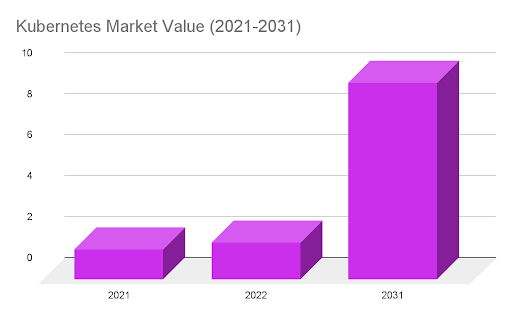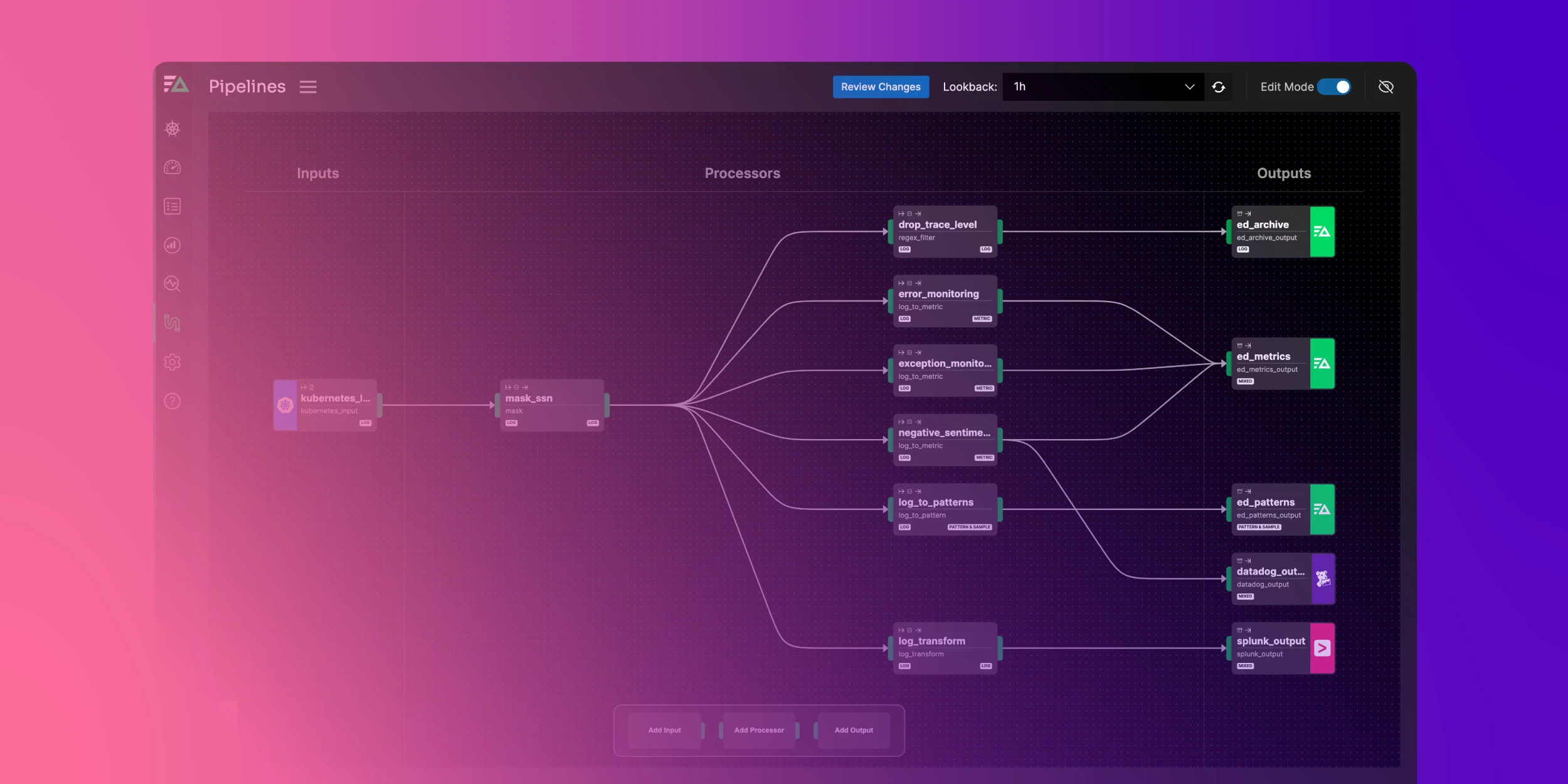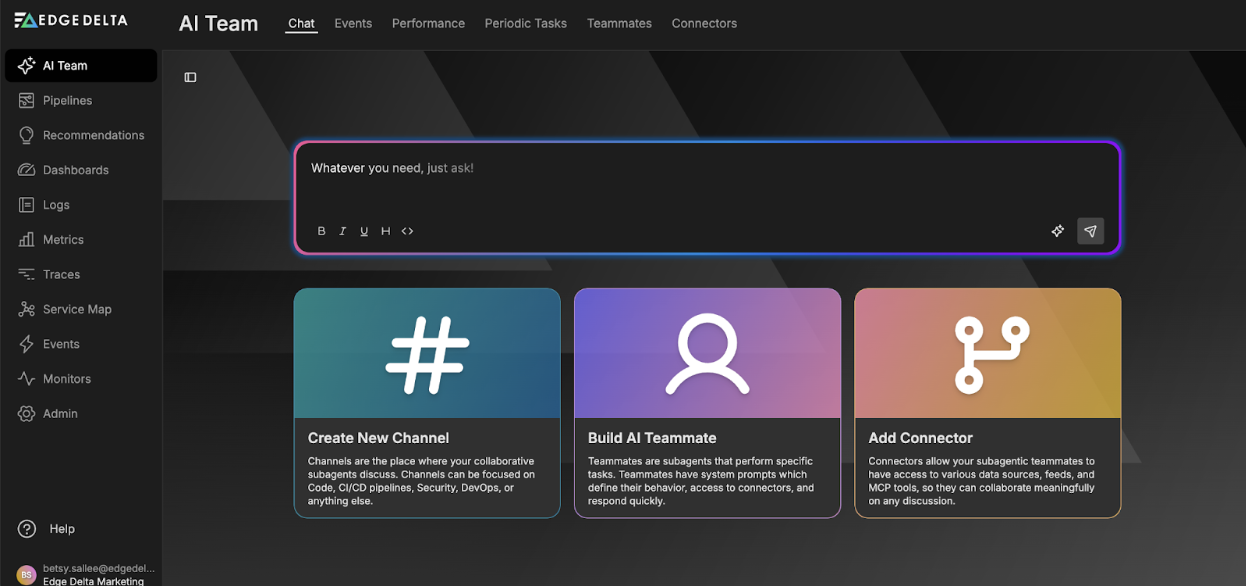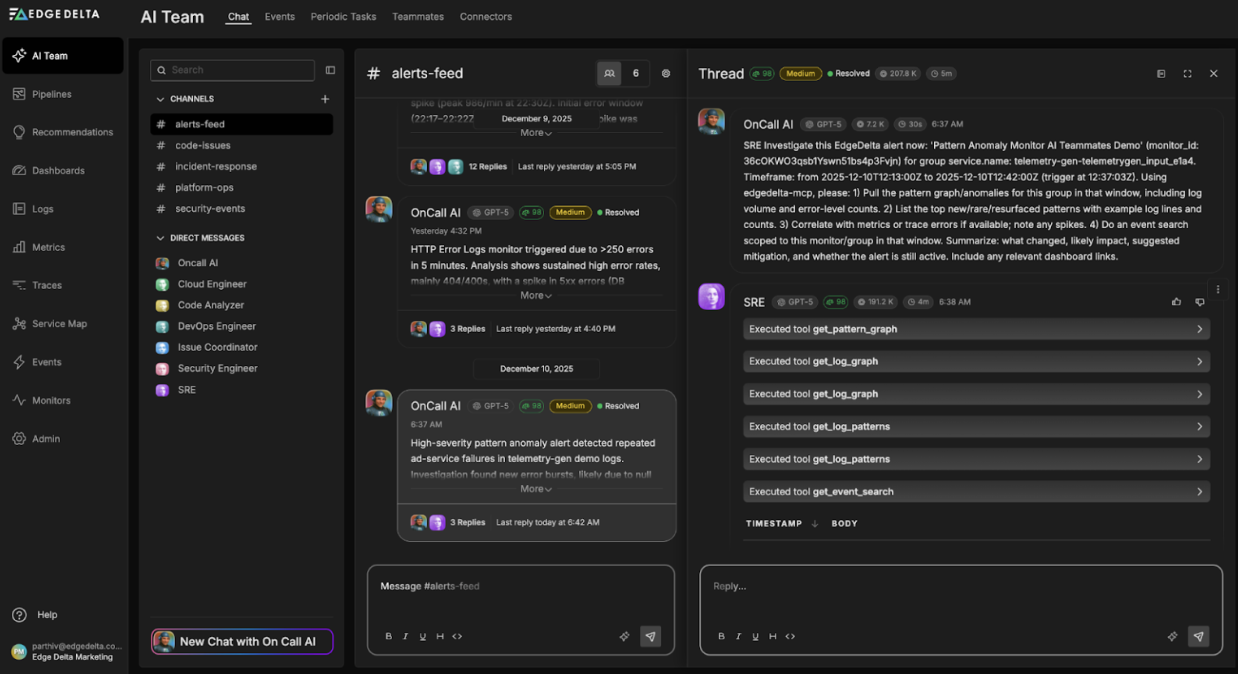In the past few years, 60% of organizations have adopted Kubernetes, and more companies are planning to do so. The dependency on Kubernetes is apparent, especially in large organizations.
Kubernetes has become the fastest-growing project in the history of open-source software. It is second only to Linux, with a market size estimated at USD 1.46 billion in 2019. Moreover, it’s expected to increase at a compound annual growth rate (CAGR) of 23.4% by 2031.
Want Faster, Safer, More Actionable Root Cause Analysis?
With Edge Delta’s out-of-the-box AI agent for SRE, teams get clearer context on the alerts that matter and more confidence in the overall health and performance of their apps.
Learn MoreThe surge in the choice to use Kubernetes shows how this platform proves to be crucial in today’s business operations. Keep reading to discover the latest Kubernetes adoption statistics and the reasons behind this trend.
Editor’s Choice:
- More than 60% of enterprises have adopted Kubernetes, and the CNCF annual survey shows that the adoption rates of Kubernetes have increased to 96%.
- The Kubernetes market is anticipated to grow at a CAGR of 23.4% by 2031.
- SlashData reports that 5.6 million developers globally are using Kubernetes.
- Global sales of containers and Kubernetes security were projected to reach USD 1,195.10 million in 2022.
- Globally, the United States accounts for over 50% of Kubernetes users.
- Kubernetes has become the cluster management solution for over 50,000 companies globally.
How Many Companies Are Adopting Kubernetes?
The Cloud Native Computing Foundation (CNCF) 2020 Annual Survey shows a substantial increase from 78% to 96% in enterprises adopting Kubernetes. These results highlight an impressive growth in Kubernetes adoption and consideration within organizations.
According to SlashData’s report, Kubernetes boasts a user base of over 5.6 million developers, representing 31% of all backend developers. It has also consolidated its dominance with a 92% share of the container orchestration tools market.
Continue reading to discover Kubernetes usage statistics by country and which region uses it more.
Kubernetes Adoption Statistics by Region: Current Trends
North America leads the world in Kubernetes adoption rates due to its developed ecosystem and advanced technological infrastructure. On the other hand, Europe is growing fast due to the need for cloud-native applications and digital transformation.
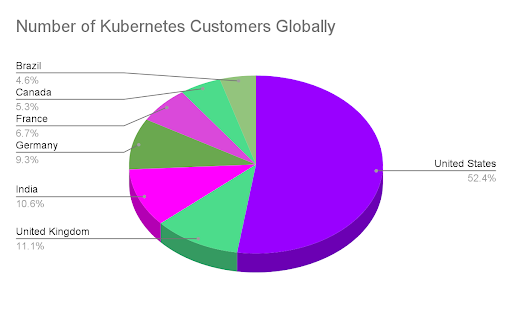
The global client base for Kubernetes demonstrates widespread use in various geographical areas. While the US leads the world with 52.4% of users, significant adoption rates ranging from 4.6% to 11.1% are also shown in Brazil, Canada, France, Germany, India, and the UK. This extensive use demonstrates Kubernetes’s attractiveness worldwide and its essential function in contemporary IT architecture in multiple countries.
| Countries | Number of Customers |
|---|---|
| United States | 17,914 |
| United Kingdom | 3,804 |
| India | 3,627 |
| Germany | 3,184 |
| France | 2,282 |
| Canada | 1,813 |
| Brazil | 1,573 |
Over 50,000 businesses worldwide have made Kubernetes their preferred cluster management solution, demonstrating the platform’s extraordinary global acceptance. This widespread worldwide presence highlights Kubernetes’ adaptability and efficiency in addressing the demands of enterprises in various sectors and industries.
1. Kubernetes is most widely adopted in the US, with 52.4% adoption rate.
(6Sense)
Part of the fastest-growing Kubernetes market, the UK is home to almost 4,000 Kubernetes-using businesses. The use of Kubernetes in Europe has surged because of its various advantages, which include transforming IT operations, speeding up cloud migration, streamlining software development processes, and enhancing edge computing capabilities.
The main motivations for the Kubernetes adoption trends in business operations are discussed in the next section.
2. 3,804 companies in the United Kingdom uses Kubernetes.
(6Sense)
Part of the fastest-growing Kubernetes market, the UK is home to almost 4,000 Kubernetes-using businesses. The use of Kubernetes in Europe has surged because of its various advantages, which include transforming IT operations, speeding up cloud migration, streamlining software development processes, and enhancing edge computing capabilities.
The main motivations for the Kubernetes adoption trends in business operations are discussed in the next section.
Why Companies Are Adopting Kubernetes: 5 Top Reasons
As technological landscapes evolve, businesses seek ways to manage infrastructure. The increase in the Kubernetes adoption statistics by year shows how vital this platform has become to companies worldwide. Its scalability, flexibility, portability, and automation are some factors that contribute to this popularity.
Here are the primary reasons businesses are adopting Kubernetes:
3. Most companies adopt Kubernetes because of its portability and flexibility.
(CNCF)
65% of a survey’s respondents run Kubernetes in several locations. Businesses with several operating locations adopt this platform for its portability and flexibility. These features make Kubernetes ideal for implementation in various settings, such as on-premises, private clouds, public clouds, or hybrid configurations.
Workloads can quickly move between several infrastructures, improving agility and making it easier for businesses to adjust to changing needs.
4. 44% of Kubernetes users use the platform to automate operations such as producing apps or business segments.
(CNCF)
Kubernetes automated operations simplify application management by using built-in commands to manage repetitive chores. By automating processes, you may free up time and resources by ensuring that apps always function as per your specifications.
5. DevOps are the most common users of Kubernetes for its open-source interoperability features.
(RedHat)
RedHat’s survey reveals that 62% of respondents mention that DevOps or DevSecOps is responsible for container and Kubernetes security. Since Kubernetes is an open-source platform with interoperability features, it needs constant security and monitoring, and DevOps teams are the best ones to manage it.
The compatibility of Kubernetes with other open-source cloud-native technologies allows its easy integration with databases and development tools. This interoperability allows the ability to use various tools without being restricted to proprietary platforms and speeds up the creation and deployment of applications.
6. 48% of organizations adopt Kubernetes for its infrastructure abstraction to develop or evolve areas that need maturing.
(Statista)
Infrastructure abstraction removes the complexity of managing computation, networking, and storage. This allows developers to focus on creating and implementing applications rather than worrying about the nuances of the underlying environment.
This feature is one of the reasons why Kubernetes adoption increased. Using Kubernetes, businesses can quickly develop areas that need maturing or evolving. Its containers’ isolated properties make decoupling some from the infrastructure possible. Moreover, it becomes lightweight and easier to manage.
7. Service Health Monitoring: 93% of organizations use or plan to use containers in production
(CNCF)
Another essential component of Kubernetes is service health monitoring, which involves regularly checking the health of services. Kubernetes automatically restarts containers that stop responding, guaranteeing continuous service availability.
This proactive approach to service management improves the user experience and reliability by ensuring that consumers only engage with healthy and operational services.
Note
Due to the significance of service health monitoring, users must always ensure that the Kubernetes runs smoothly and remains available. For this reason, it’s an excellent practice to monitor Kubernetes using tools like Edge Delta. This monitoring process covers the collection, analysis, and visualization of Kubernetes telemetry data to ensure workload health and performance.
Continue reading to discover Kubernetes’ adoption rate growth since its release ten years ago.
Conclusion
Kubernetes offers practical solutions to several challenges that enterprises across many industries face. These features are helpful, especially when upgrading their infrastructure to adapt to continuously shifting digital landscapes.
Due to persistent security concerns, Kubernetes functions become necessary in many enterprises’ infrastructure. Its features are useful in many use cases and deployment settings like containers and serverless operations. Thus, this open-source platform is now more than a tool for specialized uses. Organizations now see it as a vital tool in today’s digital environment.
The significance of this platform in an operation makes it crucial to maintain its health and keep its performance smooth. For this reason, deploying third-party observability tools like Edge Delta on Kubernetes is worth considering. This way, you can get real-time alerts to your Kubernetes environment and track the health of your Kubernetes-based apps from a single pane.
FAQs on Kubernetes Adoption
Is Kubernetes adoption slowing?
No, the Kubernetes adoption acceptance rate is continually increasing, with 96% of enterprises using it.
Is Kubernetes still relevant in 2024?
In the rapidly changing world of technology, Kubernetes will continue to rule as the go-to platform for container orchestration in 2024.
How widely used are Kubernetes?
Kubernetes has over 50,000 users, over 500 meetups worldwide, and almost 2000 contributors.
What is the growth rate of Kubernetes?
The market for containers and Kubernetes security is projected to grow at a CAGR of 27.60%, reaching USD 10,716.68 million from 2023 to 2031.




